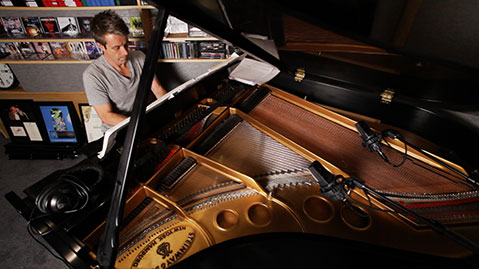Score
Director Matt Schrader

In Score, director Matt Schrader focuses on the role of music in movies and the composers who orchestrate them. Through dozens of interviews with influential composers and film aficionados, Schrader tunes us into the craft of movie music magic, from the earliest talkies to contemporary computer-animated comic book epics. See Score-Movie.com.
What inspired you to make this documentary?
I’ve loved film music as long as I can remember, and always been fascinated by the way it changes the meaning of a film. The right combination of music can make the visual feel completely different, and a certain visual can make music feel completely different. The interplay between them is where the magic happens, and we felt this was an area that needed to be explored and celebrated for the awe-inspiring effects it can often have on us in film.
I am pretty astounded at the roster of composers you managed to interview for this documentary. How did it all come together?
It took a long time! We were persistent from the start and believed the film would happen. Though many of these composers are incredibly busy, enough bought into our passion early on that we were able to build momentum and gather almost everyone we’d originally planned. In the end I believe we did 60-something interviews, and I believe 57 made it into the final film. We were really happy to be able to represent such a broad spectrum of film music to capture what we hope is the definitive look at this amazing art form.
So much of cinematic music is driven both by technological and cultural changes. What would you note as the important changes of the last several years? And/or, how do you see the cinematic music-scape changing in the next several years?
Technology is a big driver today, but it’s used more as a tool to accomplish something a composer already has in mind. Many composers say they used their computers as a way to keep track of their musical ideas and refine them into exactly what they want. There’s also the soundscape aspect of technology and creating digital instruments that sound nothing like the real world. That’s led to a lot of amazing sound-design-driven music. I think we’ll continue to see those ideas explored, but after putting together this film, it’s clear that the ability to write and communicate through a tune is the real magic behind scores.
Clearly the visuals depend upon the music — but did you come upon any instances where the score actually re-shaped the course of the film production, where the visuals adapted to the music?
A lot of films have actually used the score on set to try to get actors into the right mood. Tyler Bates talked about doing this for Guardians of the Galaxy, and Hans Zimmer told us about his doing this with Chris Nolan as well. It’s really incredible when you realize how music can do so much to affect the emotional tone of a film — even when it’s being shot!
What are your favorite film scores and/or composers, and why?
There are so many! The great thing about film scores is they’re like ice cream flavors: There are so many different types that are absolutely fantastic it’s hard to always pick the same thing. I adore Laurence of Arabia, Vertigo, Danny Elfman’s Batman score, and Hans Zimmer’s The Dark Knight and The Dark Knight Rises. Actually, it’s amazing how many Batman scores have been absolutely incredible. On the softer side, Finding Nemo is an incredible soundscape by the maestro Thomas Newman. I also love Trent Reznor and Atticus Ross’ score to The Social Network and Alexandre Desplat’s scores to Argo and Grand Budapest Hotel.



